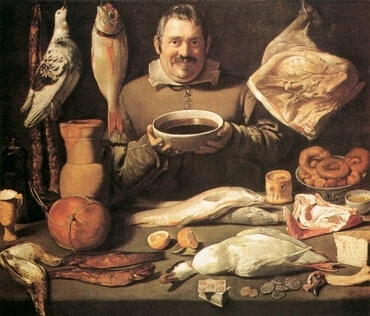680. The fact that goods and truths are man's real food may be clear to anyone, for the person who is deprived of them has no life within himself, and is a dead man. The food on which the soul of the person feeds who is dead in this sense consists of the delights arising from evils, and of the pleasures gained from falsities. These are the food of death. These delights and pleasures also derive from bodily, worldly, and natural things, which have no life at all within them. Furthermore such a person does not know what spiritual and celestial food is. Every time 'food' or 'bread' is mentioned in the Word he assumes that food for the body is meant. In the words of the Lord's Prayer, 'Give us our daily bread', for example, he thinks purely of nourishment for the body. There are some whose ideas do extend further and who assert that this petition includes all other physical requirements, such as clothing, money, and so on. Indeed they will argue fiercely that no other kind of food is meant, even though they clearly see that the petitions coming before and after it entail purely celestial and spiritual things, and refer to the Lord's kingdom, and possibly know as well that the Lord's Word is celestial and spiritual.
[2] From this and other similar considerations it becomes sufficiently clear just how bodily-minded the man of today is, and that like the Jews, he is unwilling to accept anything stated in the Word except in a very crude and materialistic way. The Lord Himself clearly teaches what His Word means by 'food' and 'bread': He speaks of food in John as follows,
Jesus said, Do not labour for the food which perishes, but for the food which endures to eternal life, which the Son of Man gives you. John 6:27.
And of bread He says in the same gospel,
Your fathers ate the manna in the wilderness, and they died. This is the bread which comes down from heaven, that a man may eat of it and not die. I am the living Bread which came down from heaven. If anyone eats of this Bread he will live for ever. John 6:49-51, 58.
Even today there are people who, like those who first heard these words, declare,
This is a hard saying; who can listen to it? And some drew back and no longer walked with Him. John 6:60, 66.
To those people the Lord said,
The words which I speak to you, they are spirit and they are life. John 6:63.
[3] It is similar with water, in that it means the spiritual things of faith: He speaks of water in John as follows,
Jesus said, Everyone who drinks of this water will thirst again, but he who drinks of the water that I shall give him will never thirst. But the water that I shall give him will become in him a spring of water welling up into eternal life. John 4:13-14.
Even today there are people like the woman to whom the Lord spoke at the spring, who replied,
Sir, give me this water that I may not thirst nor come here to draw. John 4:15.
[4] In the Word 'food' means nothing other than spiritual and celestial food, which is faith in the Lord and love. This is clear from many places in the Word, as in Jeremiah,
The enemy has stretched out his hand over all the desirable things of Jerusalem, because she saw the nations come into her sanctuary, concerning whom You did command, They shall not enter your congregation. All the people groan as they search for bread. They have given their desirable things for food to restore the soul. Lamentations 1:10-11.
Here no other bread or food is meant than spiritual, for the subject is the sanctuary. In the same author,
I called to my lovers, they deceived me. My priests and my elders breathed their last in the city, for they sought food for themselves to refresh their soul. Lamentations 1:19.
Here the meaning is similar. In David,
They all look to You to give them their food in due season. You givest to them - they gather it up. You openest Your hand - they are satisfied with good. Psalms 104:27-28.
This in like manner stands for spiritual and celestial food.
[5] In Isaiah,
Everyone who thirsts, come to the waters, and he who has no money, come, buy, and eat! Come, buy wine and milk without money and without price. Isaiah 55:1.
Here 'wine and milk' stands for spiritual and celestial drink. In the same prophet,
A virgin is conceiving and bearing a son, and you will call His name Immanuel. Butter and honey will He eat that He may know to refuse the evil and choose the good. It will be that because of the abundance of milk they produce he will eat butter, for butter and honey will everyone eat that is left in the midst of the land. Isaiah 7:14-15, 22.
Here 'eating honey and butter' means that which is celestial-spiritual, and 'those who are left' stands for remnants, which are referred to in Malachi as well,
Bring all the tithes 1
to the storehouse that there may be food in My house. Malachi 3:10.
'Tithes' 1
stands for remnants. Further concerning the meaning of 'food', see 56-58, 276.
Imibhalo yaphansi:







